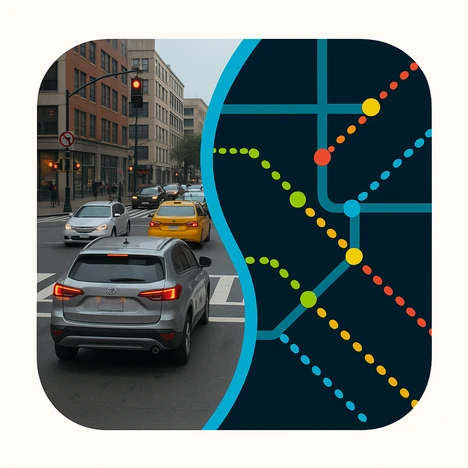Calibration and Simulation of Urban Intersections Using Real-World Data
- Sponsored by: TUM Ethics in Systems Design and Machine Learning in cooperation with thireks GmbH.
- Project lead: Dr. Ricardo Acevedo Cabra
- Scientific lead: Prof. Niki Kilbertus, Dr. Ronald Kates, Dr. Pascal Brunner.
- TUM co-mentor: TBA
- Term: Winter semester 2025
- Application deadline: Sunday 20.07.2025
Apply to this project here

Motivation
Urban intersections play a crucial role in shaping traffic flow, safety, and environmental outcomes. Optimizing these intersections through data-driven simulation can help cities reduce congestion, improve road safety, and lower emissions. To support informed decision-making, city planners need realistic simulation models that accurately reflect real-world traffic conditions and allow for testing various modifications. The KIVI research intersections in Ingolstadt offer a unique and high-quality dataset that makes it possible to calibrate and validate such simulations with real traffic patterns—enabling a reliable foundation for AI-driven urban traffic management. Data source: So soll Künstliche Intelligenz im Ingolstädter Verkehr helfen | BR24
Goals
Implement a data calibration pipeline to prepare real-world traffic data for the opens source traffic simulation SUMO (Simulation of Urban Mobility: eclipse.dev/sumo). • Calibrate a SUMO simulation model using data from three KIVI intersections in Ingolstadt, applying advanced AI techniques to analyze current traffic flows and generate synthetic trajectories—especially for VRUs and cyclists with unpredictable behavior. • Run simulations to evaluate changes in: Efficiency, Safety, Emissions. • The simulation will generate hundreds of thousands of realizations of various traffic scenarios, which will serve as a big data foundation for statistical analysis to identify significant differences. • Visualize outcomes in a user-friendly Dashboard.
Requirements
Knowledge of Python and data analysis libraries (e.g., pandas, NumPy). • Familiarity with SUMO (Simulation of Urban Mobility) or willingness to learn. • Experience with data preprocessing and calibration techniques is a plus. • Ability to apply statistical methods to evaluate simulation results. • Frontend skills for building a simple Dashboard using HTML/CSS/Bootstrap. • Optional: Basic understanding of traffic modeling and simulation principles.
About Us
This project will be hosted at the chair of Prof. Kilbertus at the Informatics Department of TUM. The project will be supervised by the Thireks team. We are a young start-up (www.thireks.com) from Ingolstadt. Using probabilistic models and AI, our technology realistically simulates human-like road users—each making individual decisions based on events, probabilities, and dynamic data, including representative misbehavior—making it perfect for analyzing traffic safety.
Apply to this project here